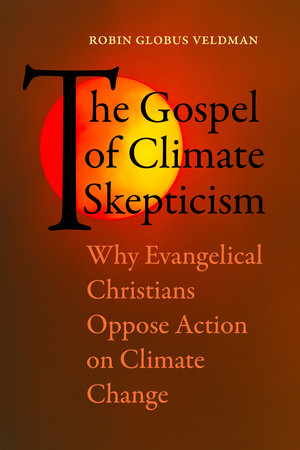This guest post is published as part of our blog series related to the annual meetings of the American Academy of Religion & Society for Biblical Literature November 23-26 in San Diego. #aarsbl19
By Robin Globus Veldman, author of The Gospel of Climate Skepticism: Why Evangelical Christians Oppose Action on Climate Change
For several years before attending graduate school, I lived in Albuquerque, New Mexico. A thin ribbon of river, the Rio Grande, runs through the city, nourishing a band of green that contrasts with the wide expanse of dry desert surrounding the city. Perhaps this visual reminder of the precarious position of human civilization, in this case sustained by water borrowed from the other side of the continental divide, explains why so many people I met there were environmentally apocalyptic, believing that civilization was teetering on the brink of catastrophe. Whatever the reason, when I saw “environmental apocalypticism” listed as a potential paper topic in a class in graduate school, I knew that it was something I wanted to explore further. Following that trail led me first to write about how fears of societal and ecological collapse associated with the environmental movement often blended both secular and religious elements. Exploring the power of environmentally apocalyptic beliefs led me to become interested in a more overtly religious manifestation of the apocalyptic impulse, evangelicals who believe that Jesus Christ will return to earth someday (possibly soon), bringing about the end of the world. In particular, I was intrigued by the claim, advanced by prominent public figures like Al Gore and Bill Moyers, that evangelicals’ belief that the end was near might make them careless stewards of the earth’s natural resources.
Given where I started, it is surprising—even to me—that I ended up researching how climate change is presented on Christian radio and television (as I detail in Part II of my book, the short answer is: very inaccurately). Among the many things this research impressed upon me, what stands out is the extent to which Americans live in different cognitive worlds. As I learned, these different worlds are shaped, perhaps in large part, by the different media we consume. Those who watch MSNBC, read the Washington Post and listen to NPR end up with a very different view of the world than those who watch CBN News (from the Christian Broadcasting Network), read the Christian Post, and listen to “Washington Watch,” a daily radio program that “presents Washington news from a conservative Christian perspective.” Not only are the stories different (i.e., different issues are considered newsworthy), but the affect that is subtly communicated in those stories—who is portrayed sympathetically, for example, or treated as worthy of suspicion—varies tremendously. Through my research I have come to see that this has powerful consequences for environmentalism. In the evangelical media I’ve analyzed, climate activists are consistently cast as untrustworthy, or having ulterior, or even anti-Christian motives. This subtle emotional valence—often presented alongside false or misleading information about climate science—creates a powerful frame that audiences can bring to the next story about climate change, whether it is encountered in the evangelical media or elsewhere.
These observations about the power of media seem disconnected from what originally inspired me to study evangelicals—an interest in apocalypticism. But perhaps this is the case with many projects: apocalypticism was a single thread that when tugged, pulled a completely unexpected world into view.

